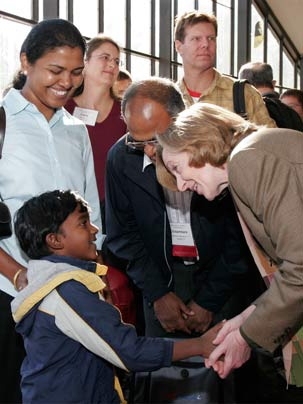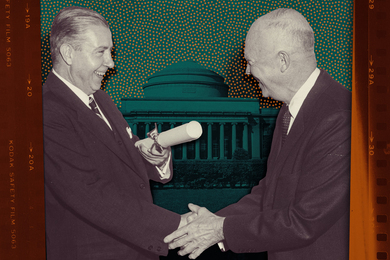MIT students need experiences beyond the classroom to prepare for career success, according to a Family Weekend panel that outlined ways students can enrich their personal and academic experiences--and get a leg up on their first job.
The panel, one of dozens of talks, tours and events that drew more than 2,300 parents, siblings and friends to campus Oct. 12-14, featured advice from the MIT Careers Office and the MIT Alumni Association, which hosts Family Weekend.
John Nonnamaker, MIT Careers Office associate director, described research and work opportunities that can help students develop assets beyond the technical and problem-solving skills that potential employers expect from an MIT graduate.
"In courses and outside, students can develop analytical skills that they can use in any path they follow," Nonnamaker said. "It's also important to acquire social skills or emotional intelligence in teamwork and communications skills."
In fact, emotional intelligence ranks high among the three qualities employers seek, he said. Hiring managers evaluate potential employees in these areas: Analytical acumen counts for about 40 percent of the decision and emotional intelligence, 50 percent. The final 10 percent is earmarked for clarity of purpose, the self-knowledge that individuals need to choose satisfying work.
Experiences that can hone all three skills range from the Undergraduate Research Opportunity Program, which involves students in faculty research, to global public service projects, to the Alumni Association's January Externships, which match undergraduate and graduate students with alumni offering work experiences during IAP. Students can also take advantage of the Career Office panels where alumni describe their work in fields such as software engineering or international law, drop in for coaching on job and graduate school applications, and interview with the more than 540 companies that recruit on campus.
This year, nearly 280 alumni are offering more than 400 work opportunities for January 2008 through the Student-Alumni Externship Program, said Katie Casey, associate director of student/alumni relations for the Alumni Association. Externships, which may last a week or a month, include shadowing a surgeon, working on a business plan at a software start-up or conducting research at the National Institutes of Health. "It's a fantastic opportunity to begin to network not only with the alum sponsoring the externship but also the other alumni working in the company," says Casey. Another potential connection is the Institute Career Assistance Network (ICAN), which identifies alumni willing to share their career knowledge. Students need to sign up for Infinite Connection accounts to look up ICAN connections.
MIT students who used these extracurricular paths to success do very well. Nonnamaker noted that 45 percent of graduates go directly to graduate school, 44 percent go to work and 11 percent take an interim path such as traveling or earning a second undergraduate degree. Students apply to 5.9 graduate schools on average and receive 3.1 acceptances. Job hunters apply for 13.7 jobs and receive 2.3 job offers. Average starting salary is $61,118 for undergraduates.
A version of this article appeared in MIT Tech Talk on October 24, 2007 (download PDF).






